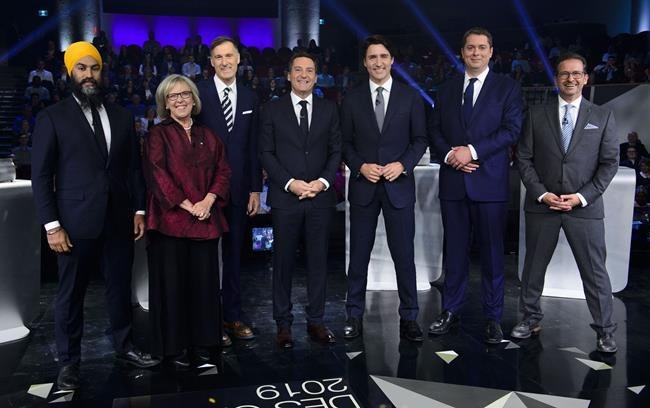OTTAWA — A review of the 2019 federal election leaders' debates says the commission organizing them should be separated more fully from government and that the standards for participation should be reworked to avoid a potential repeat of the fracas around who got into last fall's face-offs.
The final report of the 2019 Leaders' Debates Commission was released Monday, with 11 recommendations for future debates, based on the two held in 2019.
The recommendations include the creation of a permanent and publicly funded commission tasked with organizing two debates per election. The head of the commission ought to be selected with input from all political parties, not just the government, the report says.
The government should also play no role in setting the participation criteria, the report says. The commission ought to do that, and also have the final say on the debates' format and production.
"Not only do debates count, they are a pivotal moment in an election campaign," debates commissioner David Johnston, the former governor general, wrote in the report.
"They need to happen in every election, and they need to ensure that the public interest is paramount. They help us understand that democracy matters."
National English and French debates have traditionally been organized by a consortium of TV networks, but in the 2015 campaign, then-prime minister Stephen Harper refused to participate in the English event, and subsequently then-NDP leader Tom Mulcair did as well.
Other organizations stepped into the void to set up their own events but it led to uneven participation by leaders.
The Liberal government subsequently set up the debates commission in a bid to ensure what it said would be a more predictable, reliable, and stable approach to a necessary element of federal election campaigns.
The commission's report says a goal was also to have more transparency in the way debates were organized and who got to participate.
For 2019, however, the commission didn't set the participation criteria. They were included in the order the Liberal government used to create the commission in 2018.
In reviewing the 2019 debates, the commission said it heard repeated criticism that that approach created a perception of a conflict of interest, and also that some of the criteria set in 2019 were ambiguous.
In particular, a clause requiring the commission to determine whether candidates of a party had a "legitimate chance" of getting elected before extending an invitation to its leader to debate.
The result was a protracted argument over whether Maxime Bernier, the former Conservative MP who created his own splinter party ahead of the last election, ought to have a spot on the stage.
At the time, he had no elected MPs under the People's Party of Canada banner. Only himself, after having been elected as a Conservative.
He was ultimately included in the debates — the commission did its own polling of his fortunes, among other things.
The report concluded that the commission needs to set the criteria and consider making them clearer.
"The determination of debate participation criteria should not rest with the government of the day," the report says.
"No level of transparency and fairness on the part of a commission will ensure that the overall debate organization process is viewed as non-partisan if the participation criteria are perceived as being set by one interested party."
It suggested a combination of measures: a leader would be invited if the party's candidates received at least four per cent of votes cast in the previous election, or if the party has at least five per cent national support in an aggregate of current public opinion polls.
The PPC failed to elect any MPs in the election, and received less than two per cent of the popular vote.
Allowing the commission more independence would also be achieved by enshrining its existence in law and ensuring the commissioner's nomination is done in consultation with all political parties in the Commons, the report said.
Johnston was chosen by the Liberals, and while a House of Commons committee had the chance to study his credentials, the opposition parties argued they should have had input into who was going to fill the job.
In a statement, the Liberals said they welcomed the report, and were reviewing it, specifically the recommendation to make the commission permanent and publicly funded.
Michael Chong, the Conservatives' democratic institutions critic, said in theory, the commission was a good idea but it had significant flaws.
He accused the Liberals of ignoring the very spirit of it when in 2019, Trudeau did participate in other outside debates but not all, without explaining why.
"It's tainted. It's far too close to the Liberal government," Chong said.
"They should scrap it and start over."
This report by The Canadian Press was first published June 1, 2020.
The Canadian Press



